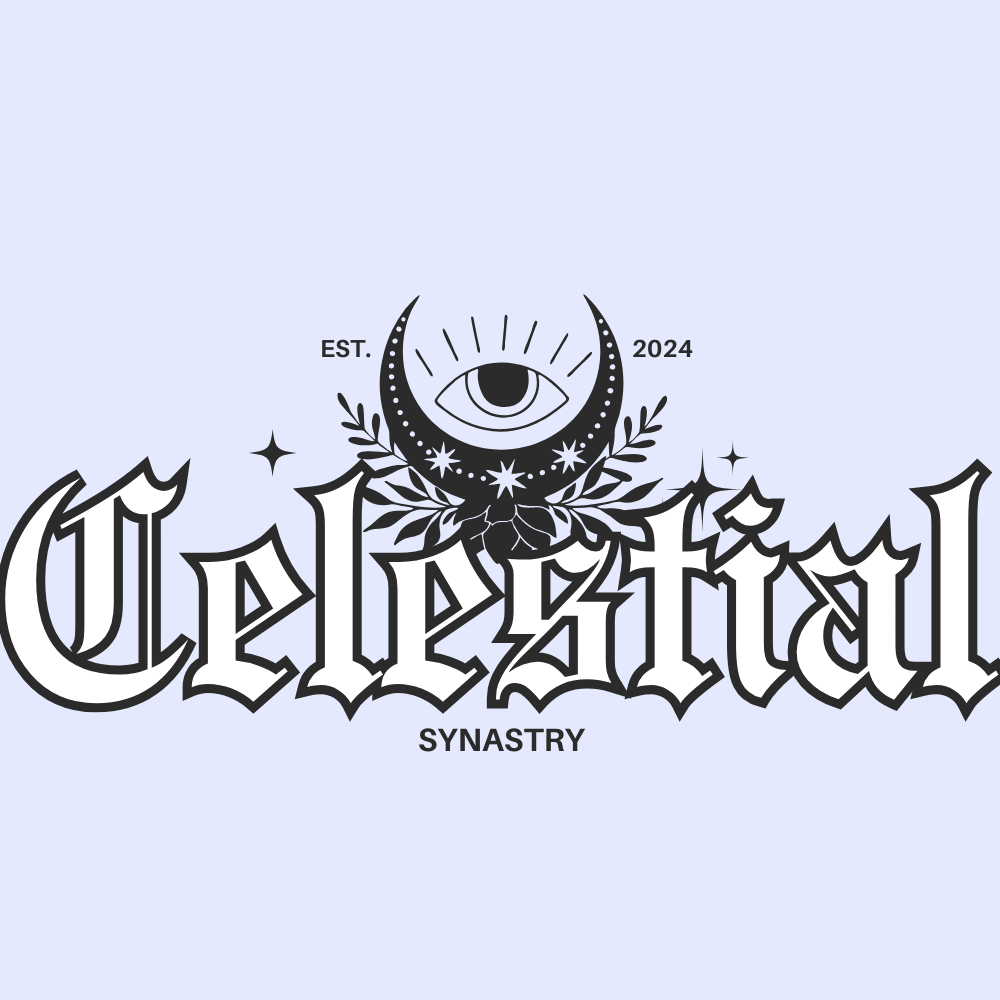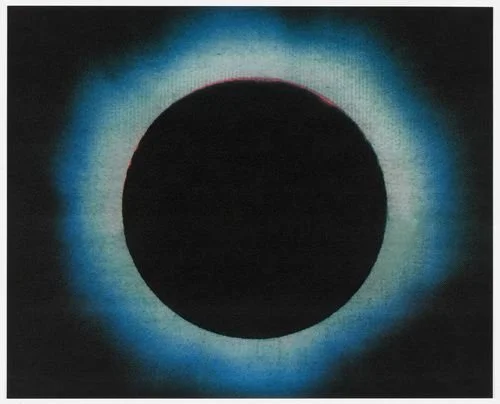Eclipses and You
Telegraph from August 12, 1999 by Douglas Gordon, Lithograph, MoMA
I was inspired to write this post awhile back because of a conversation I had with a client who was dead-set on having her wedding on an eclipse day. I strongly advised her against it. They seem like quite a trend recently during just about every eclipse season, understandably because the visual phenomenon is magnificent, with the reason given that eclipses mean "new beginnings"...sure.
"New beginnings" in the Biblical sense, perhaps, like the death of Christ and the Great Flood, the sacking of Rome and numerous natural disasters throughout history. Not sure I’d want my wedding associated with that!
Joel 2:31 (ESV) “The sun shall be turned to darkness, and the moon to blood, before the great and awesome day of the Lord comes.”
The reality is that eclipses are historically an omen of bad news, and yes, even doomed marriages: Princess Diana was married to Prince Charles during an eclipse period. From an astrological perspective, it is unwise to marry when a luminary is in actual shadow, whether it is the moon or the sun - in my opinion, a good time to marry is when both parties' moons are pleasantly aspected, and Jupiter is in the 7th house or in easy aspect to the DC angle. Let the sun be in the 10th as well... And preferably, not shadowed.
Eclipses can impact relationship astrology too, and often in ways that are not immediately obvious. They can act as catalysts, forcing decisions or emotional shifts that would have otherwise taken months or years to unfold. This is especially true in personal relationships, where unresolved tensions or unspoken truths may suddenly surface. These events don’t always break things apart, but they do demand attention. The energy of an eclipse can be compared to flipping on a spotlight in a dark room—what was once obscured is now impossible to ignore. It calls to mind this stanza from TS Eliot’s Love Song of J. Alfred Prufrock:
Should I, after tea and cakes and ices, Have the strength to force the moment to its crisis?
Lunar eclipses in particular tend to focus on emotional revelations. Since the moon governs our inner world—feelings, instincts, habits—a lunar eclipse often shakes up how we feel about someone, or how they feel about us. This can be jarring, especially if one partner has been suppressing something. You may wake up one morning around a lunar eclipse feeling completely different about a relationship than you did the day before. The eclipse doesn't create the feelings; it reveals them.
Solar eclipses, on the other hand, tend to affect our ego and conscious identity. They are often tied to shifts in how we present ourselves, what roles we are ready to play, and what paths we are ready to leave behind. In relationships, a solar eclipse might mark a turning point where someone redefines what they want, how they see themselves within the dynamic, or what they’re no longer willing to tolerate. Sometimes it marks the end of codependency or the beginning of individual empowerment within a partnership. Sometimes, it can trigger one person to realize they’ve outgrown the dynamic entirely.
The houses that the eclipse touches in your natal chart offer more insight. If an eclipse lands in your 1st or 7th house, the axis of self and partnership is activated. Eclipses here often bring major changes to how you relate to others—sometimes ushering in new people, sometimes closing the door on old relationships. In the 5th house, you might experience drama or awakening around romance, creativity, or children. In the 11th, friendships or group affiliations might shift.
What makes eclipses so potent is their connection to the lunar nodes—the North and South Nodes of the moon. These points represent destiny and karma in astrology. When eclipses occur near these nodes, the events they trigger often feel fated, as though something bigger is at play. This can be exhilarating or terrifying, depending on your chart and your perspective. In relationship terms, this might mean meeting someone who changes your life path, or recognizing that a karmic cycle with someone is complete.
It’s worth noting that not all eclipses are the same. Some are more intense than others, depending on their aspects to your natal planets. A square or opposition to Venus, for example, might stir heartache or relationship upheaval, while a trine or sextile could actually help you see things more clearly and move forward with grace. The nature of the aspect matters.
Additionally, if you or your partner have personal planets or angles (Ascendant, Descendant, Midheaven, IC) within 2-3 degrees of the eclipse point, you’re more likely to feel it strongly. If both of you do, it can act as a lightning strike to the relationship dynamic—for better or worse. I’ve seen relationships deepen tremendously during eclipse seasons, but only when both parties were ready to do the emotional work required. More often, what emerges is an imbalance that had been tolerated for too long.
It’s important to keep in mind that eclipse energy unfolds over time. Although the eclipse itself is a single moment, its effects can ripple for six months or longer. Many people experience the most dramatic changes not on the day of the eclipse, but in the weeks following, especially around the time of the next lunation. This is why eclipses are best approached with mindfulness and caution, especially when they activate sensitive points in the natal or synastry chart.
In composite charts, eclipses can signify shifts in the "relationship entity" itself. A solar eclipse on the composite sun may signify a major identity shift in the relationship—perhaps you move in together, break up, or redefine what the relationship means. A lunar eclipse on the composite moon might signal emotional climax, where old patterns are purged or brought to light. These events aren’t always negative, but they are rarely subtle.
For those who practice electional astrology—choosing auspicious dates for events—eclipses are typically avoided. The reason is simple: eclipse energy is unpredictable and often dramatic. Relationships born or formalized under this energy may carry that instability. If you find yourself entering into a new relationship during eclipse season, proceed with curiosity but caution. Ask yourself what is being revealed, what you might be ignoring, and whether you're acting from clarity or emotional overwhelm.
In synastry, if one person’s personal planet is eclipsed by transit, their behavior or emotional availability might shift dramatically, impacting the relationship as a whole. Eclipses are not inherently bad in these contexts—in fact, they can be deeply transformative—but they are better suited to reflection and internal work than to definitive, external actions.
Ultimately, eclipses teach us about impermanence and evolution. They invite us to let go of what is no longer aligned and to confront truths we may have avoided. In relationships, this can be a powerful opportunity for growth—but only if both people are willing to be honest and present. If you are navigating a relationship during eclipse season, give it space to breathe. Let things unfold without forcing outcomes. Pay attention to what the universe is showing you.
Because while eclipses may dazzle in the sky, their true power lies in what they illuminate here on earth—especially in the hidden corners of our hearts and the unspoken tensions in our connections. Watch carefully, and you might just see what you need to know.

